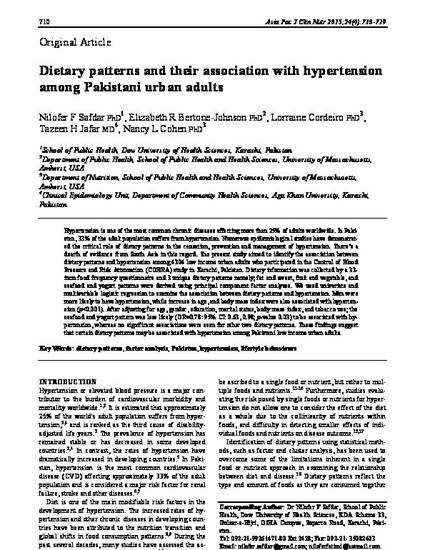
Hypertension is one of the most common chronic diseases affecting more than 25% of adults worldwide. In Pakistan, 33% of the adult population suffers from hypertension. Numerous epidemiological studies have demonstrated the critical role of dietary patterns in the causation, prevention and management of hypertension. There’s a dearth of evidence from South Asia in this regard. The present study aimed to identify the association between dietary patterns and hypertension among 4304 low income urban adults who participated in the Control of Blood Pressure and Risk Attenuation (COBRA) study in Karachi, Pakistan. Dietary information was collected by a 33- item food frequency questionnaire and 3 unique dietary patterns namely; fat and sweet, fruit and vegetable, and seafood and yogurt patterns were derived using principal component factor analyses. We used univariate and multivariable logistic regression to examine the association between dietary patterns and hypertension. Men were more likely to have hypertension, while increase in age, and body mass index were also associated with hypertension (p<0.001). After adjusting for age, gender, education, marital status, body mass index, and tobacco use; the seafood and yogurt pattern was less likely (OR=0.78: 95% CI: 0.63, 0.98; p-value 0.03) to be associated with hypertension, whereas no significant associations were seen for other two dietary patterns. These findings suggest that certain dietary patterns may be associated with hypertension among Pakistani low income urban adults.
Available at: http://works.bepress.com/lorraine_cordeiro/7/
